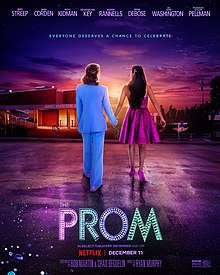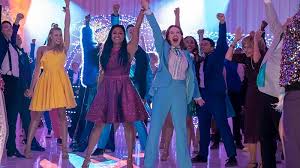|
“The Prom” stars Meryl Streep, James Corden, Nicole Kidman, Keegan-Michael Key, Andrew Rannells, Ariana DeBose, Kerry Washington, and Jo Ellen Pellman. Released on Netflix on December 11, 2020, the film has a group of actors helping a lesbian teenager attend the high school prom. The film is directed by Ryan Murphy, who also directed “Running with Scissors”, “Eat Pray Love”, and “The Normal Heart”. It is based on the 2018 Broadway musical of the same name by Chad Beguelin, Bob Martin, and Matthew Sklar. Looks like we got ourselves another feel-good musical on our hands, so let’s get ready to shake our booties and sing our hearts out. This latest film continues the trend of releasing musical extravaganzas during the month of December that started in 2017. We had musicals like “The Greatest Showman” and “Mary Poppins Returns” that turn out to be successes, both critically and financially, while “Cats” wound up in the litter box. No one ever wants to talk about “Cats”. While I haven’t actually heard of the Broadway musical until now, I was interested in seeing it regardless due to its all-star cast, its plot, which showcases the importance of inclusion, and the music. The music is pretty much one of the many cures for depression as far as I can tell, especially during a year that’s full of nothing but bad luck. With that in mind, let’s see if this prom is truly a night to remember. Similar to the Broadway musical it’s based on, the film tells the story of Dee Dee Allen (Streep) and Barry Glickman (Corden), two Broadway stars whose careers have been heavily affected by their latest flop. They later discover that a high school teenager named Emma Nolan (Pellman) wants to attend the prom with her girlfriend (DeBose). Unfortunately, the head of the PTA, Mrs. Greene (Washington), canceled the event in order to prevent Emma from doing so. Seeing this as an opportunity to reignite their careers, Dee Dee and Barry travel to a small town in Indiana with another pair of actors, Angie Dickinson (Kidman) and Trent Oliver (Rannells), to help her out. The major thing about the story in general is that it deals with discrimination against LGBT relationships. The film is set during a time when people aren’t used to a person dating someone from the same sex and they do what they can to prevent them from attending normal activities. Even though what they’re doing is pretty despicable, they wind up doing it anyway because they fear change. Like the musical, the film was intended to be a celebration of self-love and equality, to show the world that love has no boundaries, regardless of sex, age, and color. This heartfelt message was displayed in a way that colorful musicals can offer, through song and dance, and it’s something that I honestly couldn’t get enough of. While it did suffer from a couple of flaws in terms of storytelling, that doesn’t stop it from being a highly enjoyable and vibrant adaptation of the Broadway musical. Part of the enjoyment came from the cast, ranging from Meryl Streep to newcomer Jo Ellen Pellman. Meryl Streep was once again dazzling as both an actress and a darn good singer as she respectively portrays Allen as a narcissistic Broadway actress who learns the importance of putting other people’s needs ahead of hers. James Corden, Nicole Kidman, and Andrew Rannells also did very well with their performances as Barry, Angie, and Trent respectively. There were plenty of people that didn’t like Corden’s performance, but personally, I thought he did fine. I would also have to give credit to Jo Ellen Pellman for her heartwarming portrayal as Emma. Not only was her acting believable, but her singing was just as beautiful as an angel’s voice from heaven. In fact, I thought the entire cast did a phenomenal job with their singing, which helped made the musical numbers endearing, upbeat, and radiant. The musical numbers were some of the best parts of the film in my opinion, mostly because of the choreography, its stage-like set designs, and its energetic flair. There were at least 19 songs in the film, including the last two during the end credits, and they were a pleasure to listen to. The only downside to this, however, is that they can break up the pace a bit in terms of how they placed the songs, which would explain the two-hour-plus runtime. The story worked well in honoring its message about inclusion and providing some decent characters despite a couple of familiar cliches that were seen in the other musical films. It can be a bit corny at times when it comes to the film’s emotional core, but hey, isn’t that the point of light-hearted musicals? It may not win over a lot of people who aren’t huge musical fans, but for those who don’t mind its corniness, it can be a pleasant time-waster. I guess you can say that this is somewhat reminiscent to “The Greatest Showman”, which is another light-hearted musical that celebrates the importance of equality. They may not have been able to take their themes even further, but their intentions were pretty noble thanks to their feel-good tones and their upbeat songs. Overall, while far from a perfect adaptation, “The Prom” works as both an entertaining and colorful musical and a worthy celebration of self-love and respecting people’s differences. Despite a few tropes and its corniness, the film wasn’t afraid to appreciate its own good intentions by displaying a fun cast, a decent story, and a bunch of musical eye candy. Like I mentioned before, it’s not going to impress everybody because there are several people out there who would rather prefer a much more serious take on the LGBT relationship. However, I would say that it might impress those who are big fans of light-hearted musicals and big supporters of LGBT representation. B
1 Comment
|
Home of the most friendly movie reviews on the planet.
Categories
All
Follow Me |
- Home
- Classic Reviews
- 2015 Reviews
- 2016 Reviews
- 2017 Reviews
- 2018 Reviews
- 2019 Reviews
- 2020 Reviews
- 2021 Reviews
- 2022 Reviews
- 2023 Reviews
- 2024 Reviews
- Movie Talk
-
Fan Fictions
-
Ed, Edd n Eddy: The Ultimate Ed-Chronicles
>
-
The 'Beginnings' Saga
>
- Ed, Edd n Eddy: The Rise of Maleficent >
- Transformers: Legend of the Black Cauldron >
- Ed, Edd n Eddy meets the Penguins of Madagascar >
- The Eds and Iron Man: Dawn of the Blowhole >
- Ed, Edd n Eddy: The Fast and the Furious >
- The Eds and Kung Fu Panda: Battle for China >
- Ed, Edd n Eddy and the Lion King: The Full Circle >
- Ed, Edd n Eddy meets Thumbelina: Revenge of the Shredder >
- Ed, Edd n Eddy: Journey to Neverland >
- Ed, Edd n Eddy: All Tangled Up >
- Ed, Edd n Eddy's Frozen Adventure >
- Ed, Edd n Eddy's Edventures in San Fransokyo
- Ed, Edd n Eddy: Return to Neverland
- Ed, Edd n Eddy vs The League of Evil
-
The 'Avengers' Saga
>
- The Eds and the Little Mermaid: Age of Extinction
- Ed, Edd n Eddy meets the Ghostbusters
- Ed, Edd n Eddy: A Sea of Adventure
- Ed, Edd n Eddy meets Anastasia
- Ed, Edd n Eddy in Who Framed Roger Rabbit?
- Ed, Edd n Eddy meets the Incredibles
- Ed, Edd n Eddy and the Lion King 2: Simba's Pride
- Ed, Edd n Eddy: Brand New Zootopia
- Ed, Edd n Eddy: Into the Sugar Rush
- Ed, Edd n Eddy and the Big Sea Quest
- Ed, Edd n Eddy: Heroes Assemble
- Fastformers: Rio Heist
- The Loud Ghostbusters >
-
The 'Beginnings' Saga
>
-
Ed, Edd n Eddy: The Ultimate Ed-Chronicles
>
- Contact
- About


